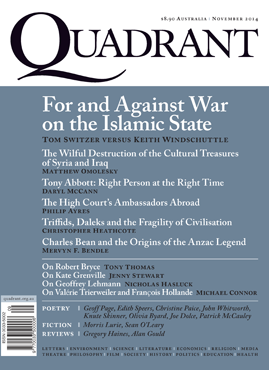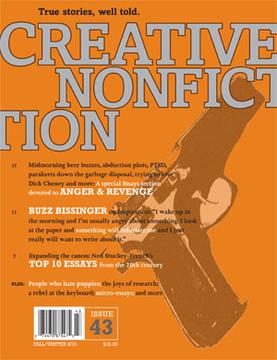
Truganini, also known as Lallah Rookh was an Aboriginal Tasmanian woman. She was one of the last native speakers of the Tasmanian languages and one of the last individuals solely of Aboriginal Tasmanian descent.

Rodney Peter Croome AM is an Australian LGBT rights activist and academic. He worked on the campaign to decriminalise homosexuality in Tasmania, was a founder of Australian Marriage Equality, and currently serves as the spokesperson for the Tasmanian Gay and Lesbian Rights Group and a spokesperson for LGBT advocacy group Just.Equal.

Margaret Daphne Scott was an Australian author, poet, comedian, educator and public intellectual.
Anne Kellas is an Australian poet, reviewer and editor, who was born in South Africa and emigrated to Australia in 1986.

Quadrant is a conservative Australian literary, cultural, and political journal, which publishes both online and printed editions. As of 2019, Quadrant mainly publishes commentary, essays and opinion pieces on cultural, political and historical issues, although it also reviews literature and publishes poetry and fiction in the print edition. Its editorial line is self-described "bias towards cultural freedom, anti-totalitarianism and classical liberalism".
Timothy Colin Thorne was an Australian contemporary poet.

Landfall is New Zealand's oldest extant literary magazine. The magazine is published biannually by Otago University Press. As of 2020, it consists of a paperback publication of about 200 pages. The website Landfall Review Online also publishes new literary reviews monthly. The magazine features new fiction and poetry, biographical and critical essays, cultural commentary, and reviews of books, art, film, drama, and dance.

Tasmania, for its size and population, has a flourishing literary culture. Its history offers an eventful literary background with visits from early explorers such as the Dutchman Abel Tasman, the Frenchmen Bruni d'Entrecasteaux and Marion du Fresne and then the Englishmen Matthew Flinders and George Bass. Colonisation coincided with deteriorated relations with indigenous Aboriginal people and a harsh convict heritage. These events in Tasmanian history are found in a large number of colonial sandstone buildings and in place names. Environmentally, the landscapes and changeable weather provide a vivid literary backdrop. Tasmania's geographical isolation, creative community, proximity to Antarctica, controversial past, bourgeoning arts reputation, and island status all contribute to its significant literature. Many fiction and non-fiction authors call Tasmania home, and many acclaimed titles are set there or written by Tasmanians. The journal of letters Island magazine appears quarterly. Tasmania's government provides arts funding in the form of prizes, events and grants. Bookshops contribute book launches and other literary events. Tasmania's unique history and environment gave rise to Tasmanian Gothic literature in the 19th century.
Gulf Coast: A Journal of Literature and Fine Arts is a literary magazine from Houston, Texas. Founded in 1986 by Donald Barthelme and Phillip Lopate, Gulf Coast was envisioned as an intersection between the literary and visual arts communities. As a result, Gulf Coast has partnered with the University of Houston's Creative Writing Program, the Museum of Fine Arts, Houston, and the Menil Collection to showcase some of the most important literary and artistic talents in the United States. Faculty editors past and present include Mark Doty (1999–2005), Claudia Rankine, (2006) and Nick Flynn (2007–present). The magazine publishes poetry, fiction, and creative nonfiction.

Andrew Sant is an English-born Australian poet, essayist, and former editor.

Creative Nonfiction is a literary magazine based in Pittsburgh, Pennsylvania, United States. The journal was founded by Lee Gutkind in 1993, making it the first literary magazine to publish, exclusively and on a regular basis, high quality nonfiction prose. In Spring 2010, Creative Nonfiction evolved from journal to magazine format with the addition of new sections such as writer profiles and essays on the craft of writing, as well as updates on developments in the literary nonfiction scene. As of 2023, the magazine has ceased publication, with no information provided about when or if they will resume publication.
Stephen Edgar is an Australian poet, editor and indexer.
Tasmanian of the Year Awards is an award given to the most outstanding Tasmanian in any given year. The Awards are made by the Tasmania Committee Incorporated and is organised and funded with government support. It was first awarded in 1985.

The Common is an American nonprofit literary magazine founded in Amherst, Massachusetts by current Editor in Chief Jennifer Acker. The magazine, which has been based at Amherst College since 2011, publishes issues of stories, poems, essays, and images biannually. The magazine focuses its efforts on the motif of "a modern sense of place," and works to give the underrepresented artistic voices a literary space.

Heather Rose is an Australian author born in Hobart, Tasmania. She is the author of the acclaimed memoir Nothing Bad Ever Happens Here. She is best known for her novels The Museum of Modern Love, which won the 2017 Stella Prize, and Bruny (2019), which won Best General Fiction in the 2020 Australian Book Industry Awards. She has also worked in advertising, business, and the arts.

Lesbian, gay, bisexual, and transgender (LGBT) people in the Australian state of Tasmania have the same legal rights as non-LGBT people. Tasmania has a transformative history with respect to the rights of LGBT people. Initially dubbed "Bigots Island" by international media due to intense social and political hostility to LGBT rights up until the late 1990s, the state has subsequently been recognised for LGBT law reforms that have been described by activists such as Rodney Croome as among the most extensive and noteworthy in the world. Tasmania imposed the harshest penalties in the Western world for homosexual activity until 1997, when it was the last Australian jurisdiction to decriminalise homosexuality after a United Nations Human Rights Committee ruling, the passage of federal sexual privacy legislation and a High Court challenge to the state's anti-homosexuality laws. Following decriminalisation, social and political attitudes in the state rapidly shifted in favour of LGBT rights ahead of national trends with strong anti-LGBT discrimination laws passed in 1999, and the first state relationship registration scheme to include same-sex couples introduced in 2003. In 2019, Tasmania passed and implemented the world's most progressive gender-optional birth certificate laws. In July 2023, the Tasmanian government officially included and also added "asexual or asexuality".
Cassandra Jean Pybus is an Australian historian and writer. She is a former professorial fellow in history at the University of Sydney, and has published extensively on Australian and American history.
James Chung Gon, was a prominent Chinese Australian storekeeper, tin miner, market gardener, and Baptist lay preacher in Launceston, Tasmania, Australia, who became the leader of the Tasmanian Chinese community by the time of his death at 97, and was instrumental in organising the removal of the Weldborough joss house to the Victoria Museum in Launceston in the 1930s.

Louise Oxley is an Australian poet who "often uses nature as a vehicle to enter metaphors that examine a more emotional, inner view of the world".

The Tasmanian Aboriginal Centre (TAC) is a human-rights and cultural organisation for Aboriginal Tasmanians. It was originally founded as the Tasmanian Information Centre in 1973 and has campaigned on land return, Aboriginal identity and return of stolen remains.












